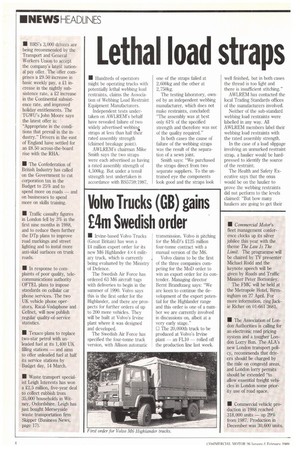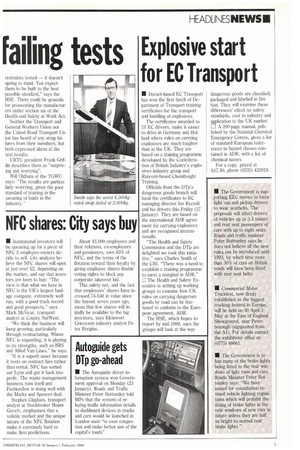Lethal load straps Failing tests
Page 6

Page 7

If you've noticed an error in this article please click here to report it so we can fix it.
• Hundreds of operators might be operating trucks with potentially lethal webbing load restraints, claims the Association of Webbing Load Restraint Equipment Manufacturers.
Independent tests undertaken on AWLREM's behalf have revealed failure of two widely advertised webbin4 straps at less than half their rated assembly strength (claimed breakage point).
AWLREM's chairman Mike Smith says the two straps were each advertised as having a rated assembly strength of 4,500kg. But under a tensil strength test undertaken in accordance with BS5759:1987, one of the straps failed at 2,600kg and the other at 2,750kg.
The testing laboratory, owned by an independent webbing manufacturer, which does not make restraints, concluded: "The assembly was at best only 61% of the specified strength and therefore was not of the quality required."
In both cases the cause of failure of the webbing straps was the result of the separation of a sewn joint.
Smith says: "We purchased the straps direct from two separate suppliers. To the untrained eye the components look good and the straps look well finished, but in both cases the thread is too light and there is insufficient stitching."
AWLREM has contacted the local Trading Standards offices of the manufacturers involved.
Neither of the sub-standard webbing load restraints were labelled in any way. All AWLREM members label their webbing load restraints with the rated assembly strength.
In the case of a load slippage involving an unmarked restraint strap, a haulier would be hardpressed to identify the source of the restraint The Health and Safety Executive says that the onus would be on the haulier to prove the webbing restraints did not perform to the levels claimed: "But how many hauliers are going to get their restraints tested — it doesn't spring to mind. You expect them to be built to the best possible standard," says the HSE. There could be grounds for prosecuting the manufacturers under section six of the Health and Safety at Work Act.
Neither the Transport and General Workers Union nor the United Road Transport Union has heard of any strap failures from their members, but both expressed alarm at the test results.
uRTu president Frank Griffin describes them as "surprising and worrying".
Will Oldham of the TGWU says: "The results are particularly worrying, given the poor standard of training in the securing of loads in the industry."








































































































































